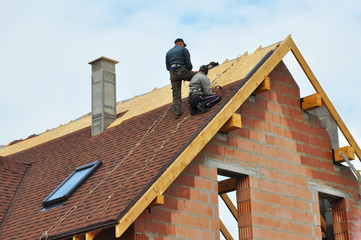How to Choose Roofing Contractors

When hiring a roofer, ensure you understand what each offers. They should have insurance and a contract outlining their safety procedures and workers’ compensation. In addition, contracts should outline when payments will be made and how long it will take to complete the work. It would be best if you also looked for a lien waiver in case a roofing contractor fails to pay you. Roofing contractors can provide free quotes.

A roofer, roofing contractor, or roofing repair contractor is a skilled tradesperson specializing in roof repair. Roofers repair, replace, and install commercial buildings’ roofs using materials such as asphalt, shingles, gypsum, and metal. They may also install insulation or make additions to existing roofs. The most common roofing materials are asphalt, slate, tiles, wood, clay, and concrete tiles. If the roof is of the type that leaks, the contractor can often repair it without additional help.
Roofing contractors offer many different types of roofing services. The most common is the construction of a new roof and the replacement of existing roofing materials. When determining whether or not a total roof replacement is needed, a professional will assess the sub-roofing beneath it. Depending on the extent of deterioration, the contractor will recommend a solution based on the type and cost of materials used. In addition to estimating the cost of each job, a roofing contractor will also provide advice on safe disposal of discarded building materials.
Before choosing a roofing contractor, research each one. Invite a few to your house to discuss the kind of roofing materials you need and the scope of the work. Ask them how long it will take, what type of manpower will be needed, and how much time it will take. Watch their demeanor, and be sure to ask for references. Finally, consider your budget and find out what you can afford. If your budget is tight, you may choose the roofer with the highest estimate and 20 years of experience. However, make sure you hire someone who is qualified for the job.
Having a list of at least three reputable roofing contractors can make the hiring process easier. But beware of storm chasers. They may have an email address that looks legitimate but is in fact a P.O. box. You can check the business’ address on Google maps and determine whether it actually owns a building. Additionally, check whether it is located on the premises or if the address is simply a storage facility for roofing materials. Some storm chasers are just fly-by-night operators. They may have a truck but no other contact information. It can be difficult to tell who is legitimate and who is not.
While choosing a contractor for your roofing project, it’s important to keep in mind the different components that make up a roof. Whether the roof has a few shingles or many, it’s still a complex system. The shingles on top are only part of a larger system that includes synthetic underlayment, starter strips, flashing, and vents. When hiring a roofing contractor, make sure they follow building codes and use products that the manufacturer approves.
Look for roofing contractors who belong to the NRCA. Membership in the NRCA is a mark of professionalism and commitment to the development of the industry. If a contractor is a member of this organization, you can be confident in their work. However, make sure you choose a company with a track record of success. It may not be cheap, but it is worth a little bit of extra time to find a roofing contractor who can meet these requirements.
Roofing contractors are an important part of a building’s exterior and can install a new roof for homeowners. They may specialize in specific types of roofs or employ subcontractors to complete larger projects. Some specialize in solar panel installation; many of these workers have experience working as electricians. You can find the perfect roofing contractor for your property by reading reviews. Make sure to get the right one, and you’ll be glad you did.
Remember that installing a roof is typically a fair-weather endeavor. But you should always be prepared for the worst – Mother Nature may not cooperate on the installation day. When it’s raining or freezing, a roofing contractor should implement cold-weather installation practices. These methods include spot adhesives to secure shingles until proper bonding takes place. Also, spot seal-down is another way to keep the roof in place until the sun comes out again.
